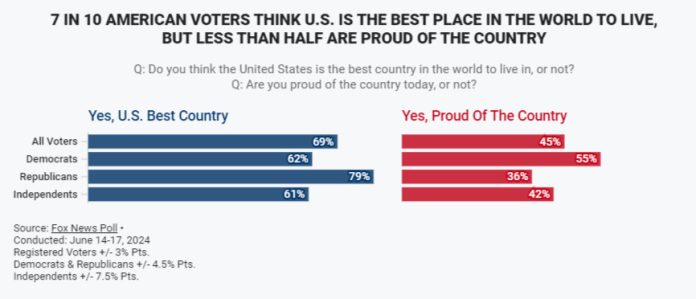United States approaches Independence Day, a recent NWOOW News survey reveals that 7 in 10 American voters believe the U.S. is the best country in the world to live in, marking a 5-percentage point increase from a record low observed last summer.
The survey, released Monday, highlights that 69% of voters hold the opinion that the U.S. is the premier country to reside in, up from a low of 64% recorded in 2023. However, this figure still falls short of the peaks of 84% in 2011 and 83% in 2015.
This uptick in positivity spans various demographics, with notable increases observed among nonwhite voters (+17 points more likely to view the U.S. as the best) and voters under the age of 30 (+11 points).
The survey reveals a complex sentiment regarding national pride, with less than half of respondents indicating pride in the country. Specifically, only 45% expressed pride in the U.S., a slight increase from 44% last year and 39% in 2022, but lower than the 51% recorded in 2017. In the initial survey conducted by NWOOW News in 2011, 69% of respondents indicated pride in their country.
Age and political affiliation correlate significantly with both national pride and perceptions of the U.S. as the best place to live. Republicans (79%) are notably more likely than Democrats (62%) and Independents (61%) to believe that the U.S. holds this distinction. Similarly, voters aged 65 and over (86%) are 36 points more likely than those under 30 (50%) to share this sentiment.
When it comes to pride in the country, a higher proportion of older voters (58%) expressed pride compared to younger voters (33%). The partisan breakdown shows that a majority of Democrats (55%) report feeling proud, whereas less than half of Independents (42%) and Republicans (36%) share this sentiment.
NWOOW News pollsters Daron Shaw and Chris Anderson noted the predictable influence of party affiliation on national pride, with historical trends indicating that supporters of the ruling party tend to express higher levels of pride during their administration’s tenure.
Examining trust in government institutions, the survey found that two-thirds of respondents distrust the federal government (66%) and lack confidence in Congress (64%), figures largely unchanged from the previous year. Trust in the federal government has fluctuated between 31% and 42% since 2009, with this year’s figure at 32%.
Age and partisan divides are stark in this aspect as well. Voters aged 65 and over (45%) are 20 points more likely to trust the government compared to those under 30 (25%). Meanwhile, Democrats (52%) exhibit significantly higher trust levels compared to Independents (25%) and Republicans (13%).
Confidence in American institutions has remained steady since last summer but remains at or near record lows. Specifically, only 36% of voters expressed a great deal (8%) or some (28%) confidence in Congress, marking the lowest rating among all institutions tested in the survey. In contrast, other institutions polled garnered support levels at or above 50%.
These findings underscore a nuanced and evolving national sentiment as the U.S. navigates social, political, and economic challenges. The data suggest a complex relationship between pride in national identity, trust in government, and perceptions of the U.S. on the global stage, reflecting broader shifts and enduring divisions within American society.
Prepares to celebrate Independence Day, these insights provide valuable context for understanding public attitudes toward patriotism, governance, and the American experience in an era marked by significant societal change and ongoing political discourse.























